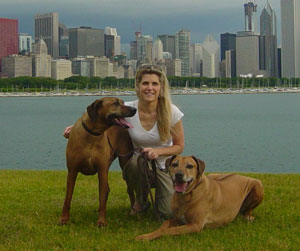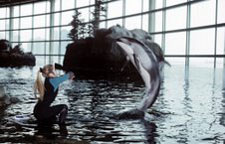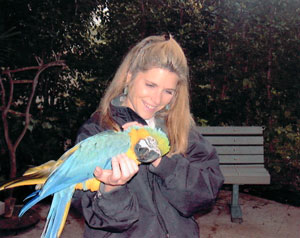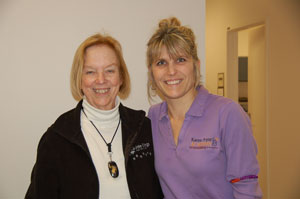Laura Monaco Torelli, Karen Pryor Academy (KPA) Certified Training Partner (CTP) and the newest member of the KPA faculty, has been a professional animal trainer for two decades. Laura was introduced to Karen Pryor's philosophy and training methods in 1991 when Laura began her career training beluga whales, dolphins, sea otters, seals, river otters, and penguins as the Senior Lead Trainer at the John G. Shedd Aquarium in Chicago. In 2000, Laura moved from marine to terrestrial animals, holding lead trainer positions at the San Diego and Brookfield Zoos. She has trained a wide variety of species, including primates, large cats, birds of prey, reticulated giraffes, Arctic foxes, horses, parrots, macaws, tree kangaroos, red pandas, and, of course, dogs! Laura's career has included one fantastic learning experience after another and is now leading her full circle—back to Karen, as she becomes the newest faculty member at Karen Pryor Academy.

When did you know that you wanted to work with animals?
I've had an interest in animals for as long as I can remember. My appreciation for animals came from my Grandma Maggie. She helped orphaned raccoons, and there are photos of me as a child holding those small baby raccoons. We couldn't have pets when I was growing up because my brother was allergic to them, but if there was ever a puppy or kitten at a place we were visiting, that is where you'd find me! I knew in high school that I wanted a career working with animals, specifically marine mammals, but the challenge was figuring out what kind of experience I needed to make that happen.
What set your career in motion?
When I was in college, I began working at a veterinary clinic and, at the same time, did anything I could do for some animal experience so that I could get on zoo grounds or into an aquarium. In 1991, an opportunity came up to work in the Brookfield Zoo bookstore. Seeing this as a great chance to be on zoo grounds, I said, "I'll take it!"
During that same time I read an article by Dr. Randall Wells, a behavioral ecologist who studies wild bottlenose dolphin societies in Florida's Sarasota Bay. I contacted him about my interest in dolphins and asked him how he got to do what he was doing. He wrote back and told me that he was looking for volunteers for his research program! Volunteering for his amazing program seemed like a terrific learning opportunity; in the summer of 1991 I joined a two-week Earthwatch expedition supporting Dr. Wells's program. That was the summer that literally changed my life and set my 20-year career in motion. Dr. Wells was the first professional to take me under his wing and show me what working with animals was all about.

Laura with Kri, a Pacific
white-sided dolphin.
Photo courtesy of Shedd Aquarium.
How did you land your first job?
One of the marine veterinarians on Dr. Wells's project was Dr. David Casper, a veterinarian at the Shedd Aquarium. Dr. Casper told me about the new oceanarium that had just opened, and encouraged me to apply to their volunteer program. I was accepted, and later that summer began as a volunteer for the marine mammal, education, and laboratory departments. Four months later, Ken Ramirez hired me as a marine mammal trainer, a position I held from 1991 to July 2000. The first book assigned to me as required reading in my new trainer position was Don't Shoot the Dog! I was over the moon!
What made you change your focus from marine mammals to terrestrials?
I had been working with marine mammals for almost a decade, and I wanted to expand my experiences and learn more about terrestrial species such as birds of prey and primates. When I was offered an opportunity to join the San Diego Zoo as the lead keeper at their Children's Zoo, I took it. It was a joy educating families and children, and a wonderful opportunity to work for the Zoo, but I really missed my family. I am a Chicago girl—I've lived here all of my life. So when I was offered a lead position at the Brookfield Zoo in the Chicagoland area in 2001, I jumped at the opportunity to return home.
Was it challenging to work with terrestrials after working with marine mammals for so long?

Laura with a blue and gold macaw
at the San Diego Zoo.
Yes, it was. While the training methodology and applications are the same for both, the biggest adjustment was learning the characteristics of a new species. Any time you work with a species that you haven't worked with before, whether it's an exotic animal or a domestic one, you are stepping out of your comfort zone. Each species possesses individual characteristics that challenge you as trainer. At Shedd Aquarium, I learned how to observe and understand the animals in order to set up both the trainer and the animal for success. Working with new species challenged me to learn more, to hone observation skills even more. I learned so much from each animal that I trained—and I'm still learning all the time.
And now your career has gone to the dogs. How did that happen?
At the Brookfield Zoo, we adopted dogs from local rescue organizations into our zoo program. There were two Border collies for outreach programs, such as sheep herding, and for grooming demonstrations, dog-friendly care education, and management and training. It wasn't long before family and friends began contacting me with dog-training questions. In 2004, I opened my own business, Animal Behavior Training Concepts, to offer dog-training services to families.
Do you think it was an advantage to have trained other species before you began training dogs?
Yes. Having trained other species helped me to be more creative and to look at the overall picture. Is it breeding season? Is there a new animal in the habitat? Is there something going on with another animal or in another habitat? What is the animal's current diet? What are the social dynamics? Being a good dog trainer is not just about the training process and communicating to the animals what you'd like them to do. It's also about observing and listening to the dogs and their owners.
As a seasoned dog trainer, what made you decide to enroll in the Dog Trainer Program at Karen Pryor Academy?
Being a good dog trainer is also about observing and listening to the dogs and their owners. Although I felt that I had a good education for working with exotic animals, working with families and their dogs requires a different skill set. In 2007, I contacted my mentor Ken Ramirez to ask him what options were available. Ken told me that Karen Pryor Academy had just launched, and he suggested that I look into the Academy's Dog Trainer Program. Ken said it would be well worth my time and financial commitment. He was right. KPA allowed me to dig in deeper and learn more about what it means to teach families about dog-friendly training techniques.
What did KPA give you that you did not have before?
Community! I did not have a tight network of all the zoo and aquarium trainers I had known since 1991. But, KPA gave me that community of like-minded individuals. The proactive communication we shared as learners during the program has extended past graduation. I am still close with others from my program. If I have a training question or concern, I can send off an e-mail to dozens of people, including former classmates and other graduates of Karen Pryor Academy. I am sure to get helpful tips and responses right away. The sense of community and support always impresses me.
I was also introduced to TAGteach in the KPA Dog Trainer Program. Since graduation, I have attended Theresa McKeon's TAGteach seminars and have earned my Level 1 TAGteach Certification. The more I learn, the more obvious it becomes that there is an endless amount I can learn through the fantastic network of colleagues around me.
The more I learn, the more obvious it becomes that there is an endless amount I can learn through the fantastic network of colleagues around me.
Since my strengths are as a dog trainer and not as a business person, the business component of the KPA Dog Trainer Program was invaluable to me. KPA has helped me learn more about how to conduct my business in a proactive and professional manner.
What have you been up to since graduating from the KPA Dog Trainer Program?
KPA created another wind for my career; more doors flew open. Since I graduated from the Dog Trainer Program, my education, experience, and opportunities all keep growing. Shortly after I graduated, the Niabi Zoo in Coal Valley, Illinois, heard about me and contacted me about being their training consultant.
KPA seminars and conferences are always instructive and enlightening—and fun to attend! In 2008, I was invited to serve as the Student Application Coordinator for KPA. It was a wonderful experience interviewing applicants to the Dog Trainer Program, learning about their journeys and how they were led to KPA. I was invited to play a key role at ClickerExpo in 2009, as the Lab Coaching Manager. This was a unique role that was being organized by Karen Pryor herself! A phenomenal perk for KPA CTPs is the opportunity to assist ClickerExpo faculty members. As the Lab Coaching Manager, I was able to meet CTPs from around the world.
In 2008, I was introduced to Veterinarian Behaviorist Dr. John Ciribassi through another mentor (and KPA faculty member), Julie Shaw. Since then Dr. Ciribassi and I have set up a collaboration called Animal Behavior Partners, designed to help pet owners. I never would have connected to Dr. Ciribassi if it were not for Julie Shaw. It is also a great source of pleasure to be able to direct families to a reputable KPA dog trainer in their area for immediate help.
And now you're part of the KPA faculty. Has that changed things for you?

Laura and Karen Pryor
Yes, it has. Twenty years ago I was introduced to Karen Pryor and the concept of positive training methodology when Ken Ramirez handed me my first copy of Don't Shoot the Dog. Now that I'm part of the KPA faculty I feel like I've come full circle. I want to continue to learn as well as act as a mentor for future students, in the same way others have graciously and enthusiastically mentored me. What an honor!
What advice would you give established and aspiring trainers?
Never stop learning. Focus on your continued education. Be up-to-date on current science and evolving information. Attend conferences like ClickerExpo where you can learn from some of the best trainers. Build on collaboration so that you have the resources and support you need to be successful. Keep learning while having fun with the process. And always conduct yourself as a kind and generous professional.
Small successes lead to wonderful progress. I am still learning so much through KPA, and I look forward to helping others realize their dreams, too.


Post new comment